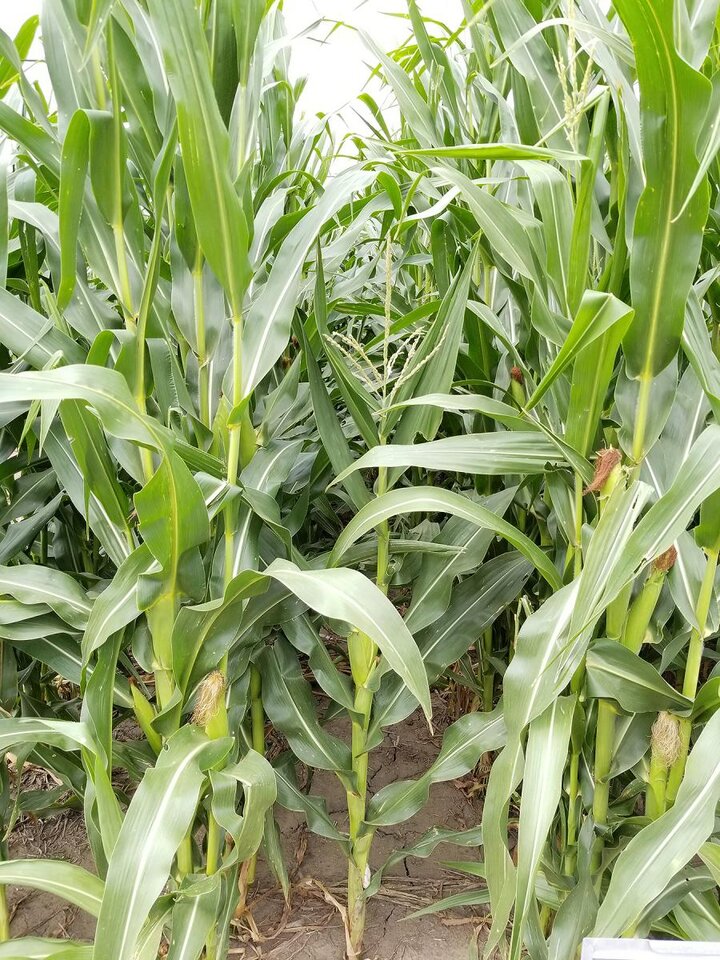Introduction
- Corn-on-corn production systems are common in highly productive irrigated fields in south-central Nebraska, which can create issues with volunteer corn management in corn fields (Figure 1).
- Many producers are rotating corn into a non-soybean crop or more commonly, utilizing a corn-on-corn production system. In south-central Nebraska especially, highly productive soils and easy access to irrigation have promoted adoption of corn-on-corn cropping systems.
- With a majority of Nebraska producers implementing no-till or reduced tillage cropping systems, management of volunteer corn has relied on POST herbicides in soybean production; however, there is no selective herbicide available in corn that can provide effective control of Roundup/Liberty resistant corn volunteers (Figure 2).
- With commercialization of stacked Roundup Ready and LibertyLink corn in 2012, planned rotations between Roundup Ready and LibertyLink corn hybrids have also become challenging for producers to implement successfully due to the prevalence of stacked glyphosate and glufosinate-resistance traits in many elite hybrids.

- With widespread adoption in the United States, glyphosate/glufosinate-resistant hybrids make both glyphosate and glufosinate ineffective for controlling volunteer corn in the following year.
- Enlist Corn is a new multiple herbicide-resistant corn trait developed by Corteva Agriscience inferring resistance to 2,4-D choline (Enlist ONE), glyphosate (Roundup), and FOP herbicides.
- Commonly integrated in LibertyLink corn germplasm, Enlist is the first commercialized HR trait provided resistance to FOPs herbicides in corn, and provides an opportunity for selective in-season management of Roundup/Liberty-resistant volunteer corn through the use of FOP herbicides. Before recommending this technology to growers, Enlist corn needs to be assessed for volunteer corn control and Enlist corn safety.

Objectives
- To evaluate Assure II for Roundup/Liberty-resistant corn volunteer control in Enlist corn.
- To evaluate effect of timing of applying Assure II (early POST versus late POST) on volunteer corn control, Enlist corn injury, and yield.
Materials and Methods
- Field experiments were conducted in 2018 and 2019 at the South Central Agricultural Laboratory (SCAL), University of Nebraska-Lincoln, near Clay Center, Nebraska. Fields were irrigated by center pivot and followed a corn-soybean crop rotation, with soybean preceding the field experiment in both years.
- To simulate uniform infestations of volunteer corn, Roundup/Liberty-resistant corn harvested from the field (F2 populations) in 2017 (Pioneer P1197 AM) and 2018 (Channel 210-26 STX) were planted in no-tillage conditions on April 26, 2018 and April 23, 2019 across the entire plot for a total of 12 rows per plot, spaced 30 inches apart. Enlist corn hybrids were planted perpendicular to the volunteer corn rows at a density of 35,000 seeds per acre in rows spaced 30 inches apart on May 7, 2018 and May 1, 2019, respectively. Enlist corn hybrid Mycogen MY10V09 was used in 2018 and Enlist corn hybrid Mycogen MY11V17 in 2019.
Results
- Assure II provided 94% to 99% control of volunteer corn at 14 days after early POST and late-POST. Similarly, at 28 days after early-POST and late-POST, Assure II provided 97% to 99% control of Roundup/Liberty-resistant volunteer corn (Striegel et al. 2020).
- Prior to harvest near the end of the growing season, Assure II provided 94% to 99% control of volunteer corn in both years regardless of volunteer corn height at the time of application.
- Enlist corn injury was not observed for Assure II applied early-POST or late-POST at any observation time.
Take Home Message
- Integration of aryloxyphenoxypropionate (FOP)-resistant Enlist corn into corn-on-corn production systems will enable control of Roundup/Liberty-resistant volunteer corn in a corn-on-corn production system.
- Results of this study indicate Assure II provided 94% to 99% control of Roundup/Liberty-resistant volunteer corn with no associated Enlist corn injury or yield loss.
- Although Enlist corn is resistant to all FOP herbicides, quizalofop (Assure II) is the only product currently labeled for control of volunteer corn in Enlist corn; therefore, other FOPs cannot be applied.
- It must be noted FOP herbicides will not be effective for control of volunteer Enlist corn because Enlist corn is resistant to FOPs; therefore, rotation of Enlist corn with soybean or other broadleaf crops where DIMs (such as Select Max or Poast) are labeled is required.
- If corn is planted the year following Enlist corn, no selective herbicide is available to control volunteer Enlist corn in corn.
Reference
Striegel A, Lawrence NC, Knezevic SZ, Hein GL, Krumm JT, Jhala AJ (2020) Control of glyphosate/glufosinate-resistant volunteer corn in corn resistant to aryloxyphenoxypropionates. Weed Technology 34:309-317
